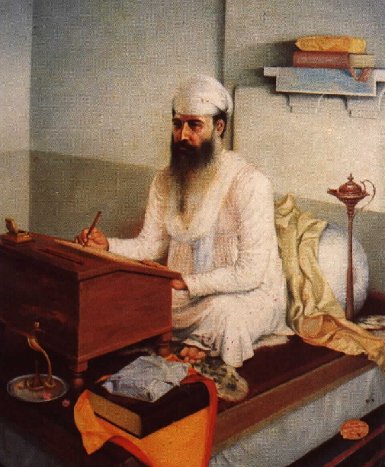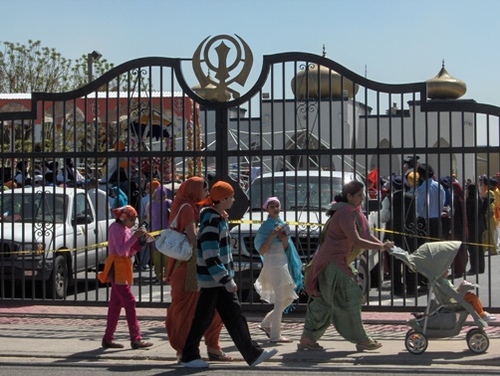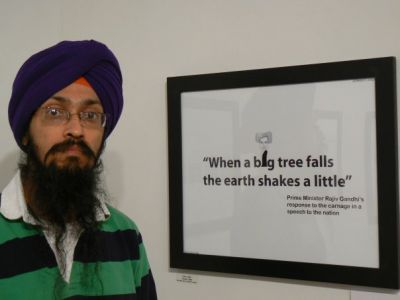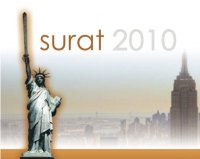
 Months ago we announced the first Sikh graduate student conference – SIKHOLARS, being hosted by the Jakara Movement and Sikh Spirit Foundation.
Months ago we announced the first Sikh graduate student conference – SIKHOLARS, being hosted by the Jakara Movement and Sikh Spirit Foundation.
Today, the confirmed participants have been announced:
- Ajeet Singh Matharu, Columbia University, History, N/A
- Arvinder Singh Kang and Amanpreet Singh Brar, University of Mississippi, Computer Science, Extending Gurmukhi Script into Twenty-first Century & Beyond
- Bandana Kaur, Yale University, Environmental Management, Reclaiming Natural Histories: Biodiversity and Landscape in Pre-Green Revolution Punjab
- Erik Resly, Harvard Divinity School, Divinity, (Re)figuring the Sikh: Theodicy, Discipleship and Narrative in Ethical Perspective
- Harjant Gill, American University, Anthroplogy, From Putt Jattan De to Munde UK De: The Transformation of Masculinities in Punjabi Cinema
- Iqbal Kaur Gill, University of British Columbia, Counseling Psychology, First Generation Canadian Punjabi Sikh Parents Beliefs about Adolescent Suicide and Suicide Related Behaviours
- Kamal Arora, York University, Social Anthropology, The Politics of Pain: Gender, Mourning and the Punjab Crisis
- Mandeep Kaur, University of Texas (Austin), Nursing, The Sikh Patient: A Review of the Nursing Literature
- Mette Bach, University of British Columbia, Creative Writing, The Changing Faces of Suburbia
- Preet Kaur Virdi, York University, Socio-Legal Studies, Silence: Resistance or Acquiescence? Sikh women’s perspectives on Canadian law
A thorougly diverse and intriguing display of scholars. We eagerly await for the conference. We hope others can attend February 20, 2010 at Stanford University.
For more information and to read the abstracts, see here.
- Ajeet Singh Matharu, Columbia University, History, N/A
- Arvinder Singh Kang and Amanpreet Singh Brar, University of Mississippi, Computer Science, Extending Gurmukhi Script into Twenty-first Century & Beyond
- Bandana Kaur, Yale University, Environmental Management, Reclaiming Natural Histories: Biodiversity and Landscape in Pre-Green Revolution Punjab
- Erik Resly, Harvard Divinity School, Divinity, (Re)figuring the Sikh: Theodicy, Discipleship and Narrative in Ethical Perspective
- Harjant Gill, American University, Anthroplogy, From Putt Jattan De to Munde UK De: The Transformation of Masculinities in Punjabi Cinema
- Iqbal Kaur Gill, University of British Columbia, Counseling Psychology, First Generation Canadian Punjabi Sikh Parents Beliefs about Adolescent Suicide and Suicide Related Behaviours
- Kamal Arora, York University, Social Anthropology, The Politics of Pain: Gender, Mourning and the Punjab Crisis
- Mandeep Kaur, University of Texas (Austin), Nursing, The Sikh Patient: A Review of the Nursing Literature
- Mette Bach, University of British Columbia, Creative Writing, The Changing Faces of Suburbia
- Preet Kaur Virdi, York University, Socio-Legal Studies, Silence: Resistance or Acquiescence? Sikh women’s perspectives on Canadian law
A few weeks ago, Maple Leaf Sikh said that “We often lament the state of our gurdwaras but we should just as often stop and think about how much we have accomplished.” How very true! How often do we highlight communities where things are working well for the Sikh diaspora?  A recent article tells us how a small town in Central California, Livingston, is helping to bridge a gap created by a cultural, linguistic and religious divide between generations. Recognizing that language is the link to religion for Sikhs, the sangat in Livingston has ensured that children in the area have the opportunity to attend Punjabi classes and learn the language.
A recent article tells us how a small town in Central California, Livingston, is helping to bridge a gap created by a cultural, linguistic and religious divide between generations. Recognizing that language is the link to religion for Sikhs, the sangat in Livingston has ensured that children in the area have the opportunity to attend Punjabi classes and learn the language.
There’s a lasting link between the 35-character alphabet used to write Punjabi and the Sikh religion. The Sikh scriptures and the Punjabi language of many Sikhs were written in a script known as Gurmukhi. So to be fully initiated into the religion, you must know how to read it… Tripat Grewal, who helps teach Punjabi language classes, said that for many Sikhs the fact that their children couldn’t understand what was being said in the temple was at the heart of the effort to create Punjabi-language classes. “The religious part was very important,” she said. [link]
When the space at the local Gurdwara became too cramped, the leaders secured classroom space at a local elementary school. While these efforts aren’t the first of its kind, it’s always great to hear a community coming together to address a need. For those of us who are familiar with the small towns scattered across central california — these punjabi classes are vital to bridging the divide between generations. With large immigrant populations and many living in joint families – being able to communicate effectively with one another is and will continue to be an important part of the diaspora.
In predominantly Christian countries like the U.S., Christmas has become a cultural holiday that even non-Christians celebrate to some extent. Most of us enjoy, at least, taking advantage of days off, eating lots of cakes and pies, and spending time with family and friends.
The Times of India thinks Christmas can do even more than give us a day off work… like heal the wounds caused by police brutality in Ludhiana against Sikh protesters of Ashutosh and the Divya Jyoti Jagriti Sansthan. Of course, TOI also mischaracterizes the conflict at issue as one between migrants who now feel left out of Ludhiana’s social fabric and Sikhs.
Christian organizations are planning to celebrate the festival by reaching out to the migrants, who have been feeling left out after the riots they were involved in and to Sikh protesters, who got hurt in police action.
“Christmas celebrations have the twin themes of peace and prosperity. We will be going to the areas like Dhandari, which have many migrants staying there and witnessed a lot of clashes during the riots,” said Albert Dua, president of Christian United Federation. [TOI]
TOI journalists may not have much of a grip on reality, and are probably overestimating what one holiday and a few days off can do. Still, I do hope you enjoy the holidays, however you spend them. Happy holidays!
On a remotely related note, if Santa were Punjabi….

Healthcare reform, immigration reform, banking reform, and the list goes on. This past week a diverse coalition lead by Rep. Luis Gutierrez (D-Ill) are laying down the marker in 2009 for comprehensive immigration reform by introducing the Comprehensive Immigration Reform for America’s Security and Prosperity (CIR-ASAP) Act of 2009. This bill has not been passed yet; it has only been introduced.
In a country built on the hard work of immigrants, it is imperative that this group be protected in the United States. Recently, there was a report that 1/3 of Los Angeles’s economy is dependent on immigrants. Also, immigrants are known for their entrepreneurship in small businesses. Tuyet Le, Executive Director of the Asian American Institute, says: “Family-based immigration has long created the foundation for strong, entrepreneurial communities across the country. This bill will reunite immigrants with their loved ones and will also provide some increases in high-skill temporary worker visas.”
This legislation focuses on undocumented students, family reunification, and worker visas-issues affecting our Punjabi Sikh community in America. For example, CIR-ASAP would allow undocumented high school graduates who came to the United States before the age of 16 to attain legal residency. This residency would open up educational and financial aid opportunities. This portion of the bill is modeled after the DREAM Act of 2009, except that it shortens the six-year wait period to three years and removes fines.
A charity based in Southall, called the Drug and Alcohol Action Programme (DAAP) will be joining forces with local Gurdwaras to address high rates of alcohol abuse taking place at Asian, particularly Punjabi Sikh, weddings. Perminder Dhillon, CEO of the charity states that “it is no longer acceptable to ignore the dangerous levels of alcohol drinking at these events.”
There is a mistaken view in Asian communities that religious and cultural backgrounds act as a barrier to the kind of drunken scenes so often seen in so many town centres all over the country. She said: “Many parents feel pressurized to provide a huge quantity of alcohol at weddings even if they themselves are non-drinkers”. [link]
She goes onto say that there are huge expectations on families to provide alcohol at weddings – often demanded by the groom’s side. This problem has become so extensive now that it is likened to demanding dowry and by partaking, “we end up supporting users with alcohol-related health problems during the binge-drinking period”.
Research published in the British Medical Journal suggests that men of South Asian origin in Britain are four times more likely to die of alcohol-related liver problems than other ethnic groups. Eighty percent of those South Asians who are vulnerable to alcohol-related mortality are Sikhs.
The charity has stated that the strategy they will use to combat this issue is simple – they will “name and shame” those involved and publicly condemn individuals on their website.
 Vishavjit Singh’s work hardly needs any introduction in Sikhdom. Since 2003, his Sikhtoons have become ubiquitous on those webpages where Sikhs are found. It was the events of 9/11 that first pushed this Sikh activist and 1984 survivor to tell his story and the stories and thoughts of so many more to pick up his pen.
Vishavjit Singh’s work hardly needs any introduction in Sikhdom. Since 2003, his Sikhtoons have become ubiquitous on those webpages where Sikhs are found. It was the events of 9/11 that first pushed this Sikh activist and 1984 survivor to tell his story and the stories and thoughts of so many more to pick up his pen.
From politics to 1984, from sports to Hindutva, few topics are beyond Vishavjit’s interest. This past fall, as so many Sikhs sought to remember 1984 in their own ways, Vishavjit Singh had a gallery display his artwork.
The New Century Artists is a nonprofit gallery caters to underrepresented communities and is among 15 galleries housed in a building located in Chelsea. From November 17th to November 28th they played host to the exhibit – When A Big Tree Falls.
Blogged by: Amol Singh
 In events and programs highlighted at remembering 25 years since 1984, the most vocal criticisms of these remembrances revolve around a desire to forgive or forget. For many it seems regressive and contradictory to highlight these tragedies while India hoists its Sikh Prime Minister to the world’s stage. On November 18, Amnesty International released a public letter to President Barack Obama, to mark Manmohan Singh’s impending visit to Washington, in which they highlighted grievances of not only Sikhs against the Indian Center, but also those of Muslims, the victims of the Union Carbide tragedy in Bhopal, the entire Northeast, Kashmir, Dalits, Adivasis, Chattisgarh, Manipur, etc.
In events and programs highlighted at remembering 25 years since 1984, the most vocal criticisms of these remembrances revolve around a desire to forgive or forget. For many it seems regressive and contradictory to highlight these tragedies while India hoists its Sikh Prime Minister to the world’s stage. On November 18, Amnesty International released a public letter to President Barack Obama, to mark Manmohan Singh’s impending visit to Washington, in which they highlighted grievances of not only Sikhs against the Indian Center, but also those of Muslims, the victims of the Union Carbide tragedy in Bhopal, the entire Northeast, Kashmir, Dalits, Adivasis, Chattisgarh, Manipur, etc.
Even though India is the world’s largest democracy, serious and disturbing human rights abuses are ongoing, including rape, extrajudicial executions, deaths in police and military custody, torture, cruel, inhuman, and degrading treatment, arbitrary arrests, and dowry deaths. The Government of India not only fails to prevent these abuses, but also shelters members of security forces from facing justice. People living in several of the northeastern states of India and in Kashmir, religious minorities, those belonging to the lowest social order called “Dalits”, and indigenous communities called “adivasis” face the brunt of these abuses. Other socially and economically marginalized groups including women face discrimination at the hands of the police and criminal justice system. Although laws were passed to address some of these human rights abuses, serious concerns remain about the implementation of such laws.
Some of the specific contexts in which mass abuses were or continue to be committed include:
Mass killings of Sikhs: Over three thousand Sikhs were massacred when the governing Congress Party incited mob violence targeting Sikh civilians in reaction to the 1984 assassination of Prime Minister Indira Gandhi by her Sikh bodyguards. Scores of women were gang raped and some were burnt alive. After two decades, a judicial commission concluded that members of the governing Congress Party were involved. Twenty five years have passed since the massacre, but only a few have been brought to justice for this mass killing. [Read Full Text]
In the coming New Year spend January attending two Sikh events-one in Canada and the other in the United States. The Toronto Sikh Retreat and Surat Sikh Conference will be taking place during the first half of January 2010.
Toronto Sikh Retreat is a 4-day retreat in the outskirts of Toronto in a winter wonderland. It will take place from January 7-10, 2010. Sikhs of various ages from around the world come together to learn, discuss  and reflect on various Sikh issues to better understand ourselves and the world around us from a Sikh perspective. With a limit of 65 spaces, the retreat provides an intimate environment for intellectual and spiritual growth through small group discussions, lectures, kirtan diwans, and creative projects (in-door and outdoor). Visit the retreat website and watch the video for more information. Registration is NOW open- take advantage of the early bird special!
and reflect on various Sikh issues to better understand ourselves and the world around us from a Sikh perspective. With a limit of 65 spaces, the retreat provides an intimate environment for intellectual and spiritual growth through small group discussions, lectures, kirtan diwans, and creative projects (in-door and outdoor). Visit the retreat website and watch the video for more information. Registration is NOW open- take advantage of the early bird special!
The Surat Sikh Conference will bring together 180 Sikh professionals in New York City & New Jersey during Martin Luther King Jr. long weekend (January 15-18, 2010) to share, learn, and reflect on the theme “A Journey Through Ardas”. Through guest speakers, workshops, and a nonprofit poster session, the goal of the conference is to provide a space of introspection for participants on how to view the world through a Sikh perspective. Participants attend kirtan diwans, have intellectual conversations and enjoy outdoor activities. Visit the conference website and watch the video under the “About” section for more information. Registration will open on December 5th!
Jr. long weekend (January 15-18, 2010) to share, learn, and reflect on the theme “A Journey Through Ardas”. Through guest speakers, workshops, and a nonprofit poster session, the goal of the conference is to provide a space of introspection for participants on how to view the world through a Sikh perspective. Participants attend kirtan diwans, have intellectual conversations and enjoy outdoor activities. Visit the conference website and watch the video under the “About” section for more information. Registration will open on December 5th!
Recent coverage on The Langar Hall led us to celebrate the victory in Surrey of the YOUTH SLATE. Now here in the United States we have the formation of the SIKH SLATE.
8 Sikh organizations (Ensaaf, the Jakara Movement, SALDEF, Sikhcess, Sikh Research Institute, Surat Sikh Conference, The Sikh Coalition, and United Sikhs) have teamed up and are calling on all Sikhs to vote for the slate on Facebook.
Just a few clicks could gain $200,000 for our community through the Chase Bank Community Giving.
CLICK HERE to vote and for links to all the Sikh organizations.
Now enjoy the Return of Billa in Part Deux and most importantly follow his advice – VOTE NOW!

Make sure you join the SIKH SLATE Fan Page on Facebook.
Please circulate widely to your family/friends (Sikhs and non-Sikhs)!
25 seconds of your time could lead to $25,000 for your community. Don’t get Billa angry!
Vote for ALL Sikh organizations. You get 20 votes! For links to the groups and directions on how to vote click here.
Please help spread this video to all your friends and family! Most importantly, make sure they follow Billa’s advice. GET OUT AND VOTE! Brothers and sisters, Singhs and Kaurs throughout the world – WE NEED YOUR VOTES and SUPPORT!
The exciting part 2 will be released later this week – exclusively on The Langar Hall.
Almost two years ago I blogged about an NPR story that highlighted the issue of Runaway Grooms. Today, I once again write about the same issue – this time the media terms it “Holiday Brides” – a different name telling the same story. We should be outraged that years after we first heard about this issue, we are still having the same conversation. We are told that about 20,000 women have been deserted by men in the UK, US and Canada who promise to return to India and never do. The most recent questions is then, why are Punjabi women still falling for this obvious scam?
In a dusty village in the Jagraon district of Punjab, northern India, 35-year-old Suman (which is not her real name), lives with her widowed mother in a small room in a crumbling building. Four years ago, the secondary school teacher married a British man in a wedding arranged by relatives. Shortly after the ceremony, her husband, who is in his 50s, left for London with the promise he would send for her. At first all appeared to go well. “He would visit two to three times a year. “Whenever he came to India, we had a good time,” she said. However, on one visit he claimed her application for a spousal visa to the UK had been refused. It was like being a prostitute you take along and have a good time with and then leave behind ‘Suman’, 35 “He told me he had applied for an appeal. “But he has never shown me a copy of that appeal. He’s never shown me any documents.” The visits and calls ended, and for the past six months Suman has had no contact with her husband. “In hindsight, it was like being a prostitute you take along and have a good time with and then leave behind. [link]
 3 clicks are all it takes. JPMorgan Chase Bank partnered up with Facebook to have sort of an “American Idol” of charity giving. The 100 charities with the most votes by December 10th will receive $25,000.
3 clicks are all it takes. JPMorgan Chase Bank partnered up with Facebook to have sort of an “American Idol” of charity giving. The 100 charities with the most votes by December 10th will receive $25,000.
CLICK HERE to vote for the Jakara Movement.
There are a great number of Sikh charities that are participating. The Jakara Movement has the most votes for the Sikh groups – and needs your support to bring $25,000 to our community to support projects by the Sikh youth. This weekend alone, the Jakara Movement had 6 events. There were 5 camps, titled, “A Nation Never Forgets” that were hosted in Los Angeles, Turlock, Stockton, Yuba City, and Orange County. Here are some pictures from just one.
In the Bay Area, the Jakara Movement helped host the forum “Women and 1984”, bringing scholars and activists such as Cynthia Keppley Mahmood (author of Fighting for Faith and Nation and a champion for human rights), Navkiran Kaur Khalra (daughter of the late Shaheed for human rights, Jaswant Singh Khalra), and Jasmine Kaur (a human rights lawyer and member of ENSAAF).
To keep programs, like this going – WE NEED YOUR HELP. We are asking for ALL Sikhs – whether in the US, UK, Canada, India, Punjab, Malaysia, Australia, Africa, and beyond to rally around the Sikh organizations and provide your support. Get your non-Sikh friends to vote too!
Log into Facebook and click HERE to vote for the JAKARA MOVEMENT. And with your 20 votes, do not forget to vote for other great Sikh organizations (ENSAAF, SALDEF, and many others) too. Inspire and be inspired; together, we are the movement.
Please forward and circulate this widely. We Need the Entire Community to Rally Behind the Sikh Youth!
Flu season along with H1N1 are in full swing right now. We worry about catching it at schools, in airports, and work. Often we hear of recommendations for people to stay home if they are sick so they don’t infect their co-workers and give themselves time to get well. However, for some staying home when you are sick comes at a large cost-a day(s) worth of wages. According to the Union Voice, “Thirty-nine percent of us have a difficult choice to make when we’re sick: go to work and risk infecting our co-workers (and risk making our illness worse), or stay home and put our finances and our jobs in jeopardy”. (hat tip: Sonny)
Thus, Senator Chris Dodd and Rep. Rosa DeLauro are pressing forward the passage of the Healthy Families Act, which was first introducted by Senator Edward Kennedy.
The Healthy Families Act would provide 7 paid sick days to all workers at companies with at least 15 employees, and would prevent employers from retaliating against workers who get sick. The bill has 113 sponsors in the House and 21 sponsors in the Senate, and has been endorsed by the Obama administration.
This bill would ensure that 3/4 of workers in the food and service industry who do not get paid sick days will be able to stay home rather than come into contact with their co-workers and the public. Taking action to pass this bill will be a positive step forward in fighting the spread of H1N1.
TAKE ACTION NOW by clicking here and sending your congressional representative an e-mail asking him/her to support this bill.
The role of Sikh women often remembered in 1984 is that of victim. Yes women were raped, killed, and left to care for their families when their male relatives were kidnapped and killed. However, the strength and perseverance to move forward without justice is often glossed over. I find it powerful to hear Sikh women’s stories of “moving on” while continuing to speak out against the horrific injustices of 1984. Often there is talk about how Sikhs have been in a state of “victimhood” for the past 25 years. I believe the stories of the women below show how some Sikhs have empowered themselves to move forward with their daily lives in the past 25 years while living with the pain and not giving up on the demand for justice. This is agency and not victimhood.
Yes institutions, memorials, and marches show how Sikhs are attempting to move forward as a community; however, these women have done something that is far more difficult-picking up the pieces of their lives in the midst of devastation and mending them together as best as they could for themselves, their families, and their community. These women are inspirational and their lives for the past 25 years show why.
Watch the videos below in Hindi to hear their stories (hat tip: Mallika). One of the most powerful reflections of 1984 I have seen.
20,000 Butchered in Delhi
25,000 Made “Disappeared” in Punjab
A Community Bruised
A Diaspora Tarnished
STILL WE RISE
A Nation Never Forgets
Remember 1984
On The Langar Hall, the fight for justice is rarely far from our minds. While justice remains elusive and mass-murderers promoted, the community suffers, but not in silence. In this 25th year of the Indian Government-sponsored pogroms, we bear witness to that genocide. We remember not only the lives lost, but call for accountability so that events such as Delhi 1984, Gujarat 2002, and the numerous human rights abuses that occur everyday in the territory that is India are not forgotten. The Indian elite may see the country as a rising economic star, but without political rights, freedoms, and a genuine commitment to justice, slogans such as “Indian Shining” fall on deaf ears.
Here is one such event that inspires us to remember:

Below the fold, see a list of upcoming events in your community. Participate, contribute, stand in solidarity – Remember 1984.
As we head into Bandi Chod Diwas/Diwali/Deva Diwali weekend, let’s listen to President Obama’s message! I appreciate his genuine effort to wish the South Asian community a happy celebration. I’m very impressed that he said “Sikh” correctly! About time we have a US President who gets it!

My only qualm (of course I have one) is that he chose to call the entire celebration “Diwali”. Diwali is more part of the Hindu religious narrative than in Sikhi or Jainism (although culturally “Diwali” is most commonly used). Nonetheless, I’m still impressed that he knew the varying significance that “Diwali” has for different religious groups. As he connects more with members of other South Asian faiths through his various initatives, I think he will learn more about the nuances of our communities.
Wishing everyone a Happy Bandi Chod Diwas/Diwali/Deva Diwali …! Enjoy the kirtan, lights, and mithayee!
Yesterday, October 12th, was “Columbus Day” – a day where the United States government honors and celebrates the achievements of Christopher Columbus. For some in the United States, Columbus Day is just another holiday. However, for many individuals and communities – it is a painful reminder that history has forgotten the facts. Christopher Columbus was a hero to some and a villain to others. What his true legacy in the Americas is and to whose expense we celebrate his “discovery” has been called into question. In fact, this notable video below asks us to reconsider why we celebrate Columbus Day and not Indigenous People’s Day.
As you listen to the voices in this video – you may relate to the emotions and words used. As Sikhs, we also won’t allow individuals such as KPS Gill to be named a hero and as humanitarians we won’t perpetuate the heroic notions of Gandhi. Heinous crimes were committed and rights were violated and yet these individuals are still celebrated for their achievements. “With all due respect,” while India [or the U.S.] goes on remembering these so-called heroes, voices in the diaspora ask you to reconsider. It is important that we stand side by side with our sisters and brothers in other communities to pay homage to their history. We must rebuild our global community together.
The bad economy has worried many of us. From losses on investments to lack of jobs, many of us worry about when the economy will turn around. Interestingly, the group most effected by high unemployment is youth. Last week, the Labor Department reported that youth unemployment stands at 18.2%, nearly twice the national average of 9.8%. The percentage of young people without a job is a staggering 53.4 percent, the highest figure since World War II. Those in the age group of 16-24 are most often the demographic who are hired for entry-level positions and groomed to take over high-level positions in the future.
Moreover, youth of color are disportionately effected by high unemployment. Nearly 40% of black youth (ages 16-19) and 30% of Latino youth (16-19) are unemployed versus only 23% of white youth. As youth of color get older, the gap widens-27.1% of black youth between the ages of 20-24 are unemployed versus 13.1% of white youth in the same age rage. This high unemployment rate for young people is startling because without more job opportunities, young people suffer not only in the short-term, but long-term. Their ability to attend college, afford healthcare, purchase homes, and save for retirement leads to long-term problems.
Rinku Sen and Billy Parish suggest in their joint article, that youth of color are the demographic who can most benefit from the new green jobs proposed by the Obama administration. These new jobs are proposed as a solution to both unemployment and saving our environment.
All help is needed to locate Karamjit Kaur,16, a Punjabi Sikh teenage girl from Reno, Nevada who went missing on Wednesday evening while r iding her bike. She had arrived from India eight-months ago and recently started learning how to ride her bike. On a hot Wednesday evening around 6:30pm Karamjit went outside in her black top and blue cotton pajamas to ride her bike and never came back home. The Reno police suspect foul play. Karamjit’s bike was found a quarter of mile away from her house by a skateboarding park.
iding her bike. She had arrived from India eight-months ago and recently started learning how to ride her bike. On a hot Wednesday evening around 6:30pm Karamjit went outside in her black top and blue cotton pajamas to ride her bike and never came back home. The Reno police suspect foul play. Karamjit’s bike was found a quarter of mile away from her house by a skateboarding park.
Karamjit is approximately 5’7” tall, 140 pounds, with long black hair and brown eyes. She has a scar on her forehead, and her left canine tooth is longer. She was last seen wearing a black v-neck short-sleeve t-shirt, bright blue cotton pajama bottoms and black flip-flops. Her family is devastated and praying that she returns home soon.
The Reno Police Department is asking for the public’s assistance in locating her. Anyone with information relating to this incident should contact the Reno Police Department at 775-334-2115, Secret Witness at 775-322-4900, or www.secretwitness.com. All calls to Secret Witness remain anonymous, and Secret Witness pays rewards for information on all crimes.
On many occasions, I have noted my dismay at the joke of journalism that calls itself the Times of India. They never cease to provide stupid nonsensical and ill-researched articles. Here is one more example.
It appears that the writer ‘Divya A’ has recently been making his/her rounds at various Sikh film screenings and festivals. Instead of lauding a young community on its tenacity to promote arts and encourage creativity in the community, the author can only wonder:
But how healthy is it for a community to focus on a painful past and present itself to the world as a suffering and wronged people?[link]
Who is the author to decide what is right or wrong for the community?
The author continues to push a nonsensical ‘Khalistani’ conspiracy theory as the raison d’etre behind the shift to visual arts. Instead of looking at the broader context of the proliferation of youtube with film and television being the visual media of the masses, the author believes there is something far more sinister.


